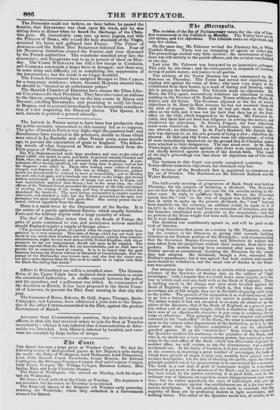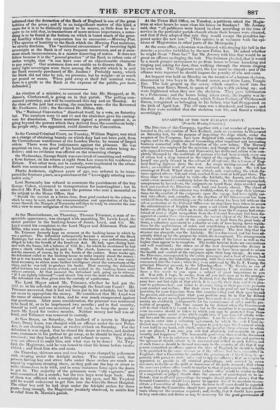The half-yearly meeting of proprietors of Bank Stock was held
on Thursday, for the purpose of declaring a dividend. The Governor moved that the dividend be 31 per cent. for six months ending in Oc- tober next. In reply to quegions from Mr. Selwyn, the Governor stated, that the " rest " on the 31st of August was 2,862,8851. 2s. 2d.; that in order to make up the present dividend, the " rest" had not been touched—on the contrary, an addition would be made to it of 64,1271. 3s. fid. ; that there had been no extension of branches, and that the branches established were profitable to the corporation rand that no portion of the Dead-weight had been sold, because the prices offered for it were insufficient.
The dividend was unanimously agreed to, and will be paid on the 11th of October.
A long discussion then arose on a motion by Mr. Thomson, censur- ing the conduct of the Directors in giving 500/. towards building churches in the Eastern portion of the Metropolis ; and recommending that the Governor, Deputy-Governor, and Directors do refund that sum, taken from the proprietors without their consent, from their own pockets. The motion having been seconded after some delay, Mr.
Fielder moved an amendment, thanking the Directors for the course they had adopted. Mr. Goldsmid, though a Jew, seconded Mr. Fielder's amendment ; but it was agreed that both emotion and amend-
ment should be withdrawn, and the usual vote of thanks to the Direc- tors was carried.
Our attention has been directed to an article which appeared in the columns of the Spectator of Sunday last, on the subject of "light sovereigns," with a request that we would make some inquiry as to the way in which such coin are dealt with at the Bank of England. There is nothing novel in the charge now once more levelled against the Bank of England ; the gravamen of which is, that when they refuse sovereigns not of full weight, they are in the habit of paying such away to the public. The ground of the accusation is so well understood, that to go into a formal examiaation of the matter is perfectly needless. We rather wonder it had not occurred to so acute an observer as the editor of the Spectator, that, if the Bank of England, as a general prac- tice, refuse coin of an undue weight, which is doubtless the case, It can have none of an objectionable character to pay away in exchange for its notes or otherwise. This principle being the one adopted and strictly enforced in the "cash-office " of the Bank, the same is necessarily acted upon in the various other departments of the institution, as it is by this means alone that the injustice complained of can be effectually guarded against. If, as the " stockbroker " from whom the editor of the Spectator receives his testimony to the prejudice of the Bank, and who is, we doubt not, a very conscientious person, has received a sove- reign in the cash-office of the Bank, which was afterwards rejected in another office, we will venture to say the circumstance was a purely accidental one. In the hurry of business, it is just possible that a clerk at the counter, in receiving a great number of sovereigns, the bulk of which have proved of ample weight, may casually have passed one of another description ; but the idea of cheating the public, upon the broad principle pointed out, is too preposterous to be entertained for a moment The truth is, a vast deal of gold of inadequate weight is sometimes tendered in payment at the counters of the Bank ; and in cases -where it has been taken by the parties tendering it in good faith, and in the ordinary way of business, its rejection causes disappointment and vexa- tion; but we rather apprehend, the class of individuals who get up charges of this nature against the establishment are of a far less meri- torious description. It is not, perhaps, too much to conclude that the majority of them are by profession dealers in light sovereigns, and nothing better. The editor of the Spectator needs not, of course, to be informed that the detraction of the Bank of England is one of the great hobbies of the press ; and if in an insignificant matter of this kind, a cause for it is to be distinctly traced to its source, as little does he re- quire to be told that, in transactions of more serious importance, a some- thing is to be found at the bottom on which is based much of the gene- ral hostility which the corporation has to encounter.—Morning Post. [The species of hostility to the Bank which the Morning Post mentions, we utterly disclaim. The "accidental circumstance " of receiving light sovereigns at the Bank is of very frequent, recurrence, and as it occa- sions much inconvenience, is a matter deserving of notice. It does not follow because it is the "general practice " of the Bank to refuse coin of undue weight, that "it can have none of an objectionable character to pay away." Our acuteness does not enable us to discern this. How many light sovereigns were there among the 280,000 which it is said the Bank recently purchased of Mr. Jaudon ? Probably many, which the Bank did not take by tale, we presume, but by weight—at so much per pound or ounce. When paid away at their full nominal value, there is a profit to the Bank at the expense of the public, pro tanto defrauded.]



























 Previous page
Previous page